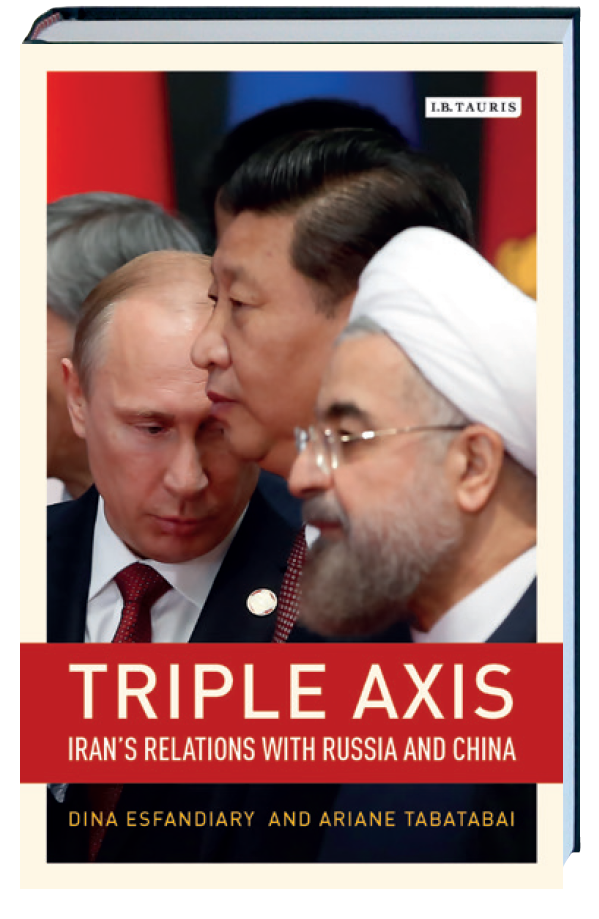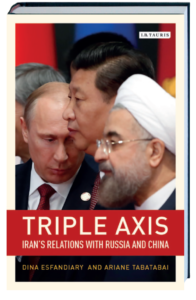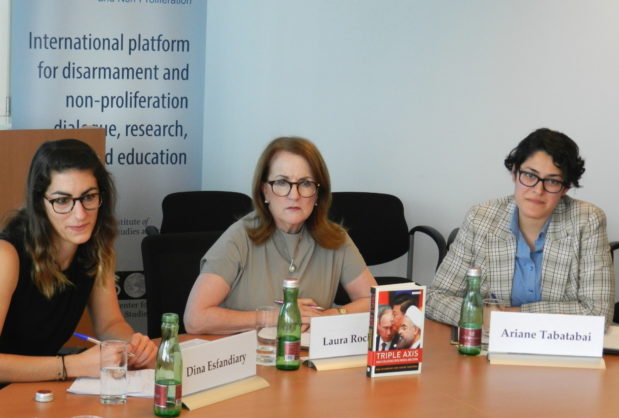
On 12 July 2018, the VCDNP hosted a launch of the book Triple Axis: China, Russia, Iran and Power Politics by Dina Esfandiary, Fellow, Centre for Science and Security Studies, King's College London, and Dr. Ariane Tabatabai, Director of Curriculum and Visiting Assistant Professor of Security Studies, Georgetown University Edmund A. Walsh School of Foreign Service.
 In their book, Ms. Esfandiary and Dr. Tabatabai argue that the relationship between Tehran, Moscow and Beijing resembles a success story for the three countries and is only going to be strengthened in the coming years. While China, Russia and Iran are often portrayed as revolutionary and ideological anti-status quo powers seeking to upend the international system, the authors make the case that the three countries are in fact highly pragmatic in the pursuit of their respective international interests within the system. It is exactly this focus on national interests that makes their economic, political and military cooperation as robust and enduring as it is today, since it allows a strict compartmentalization of their relationships. According to the authors, while there is ample cooperation whenever national interests overlap, any issue that could possibly cause conflict, such as the treatment of Muslim minorities within China, or Russia’s relationship with Israel, is carefully navigated or avoided altogether. This pragmatic modus operandi differs markedly from the US-Iranian alliance during the 60s and 70s, when a much closer relationship supposedly based on joint values led to frequent conflicts with the authoritarian Shah regime. A similar dynamic plays out in current American politics in the region. The more comprehensive approach by the US towards alliance politics leads to tensions with local partners and feeds the public perception that Washington is taking sides in regional conflicts. In contrast, the more narrow focus of the triple axis on overlapping interests provides greater flexibility, as demonstrated by Vladimir Putin’s skillful navigation of adversarial relationships in the region.
In their book, Ms. Esfandiary and Dr. Tabatabai argue that the relationship between Tehran, Moscow and Beijing resembles a success story for the three countries and is only going to be strengthened in the coming years. While China, Russia and Iran are often portrayed as revolutionary and ideological anti-status quo powers seeking to upend the international system, the authors make the case that the three countries are in fact highly pragmatic in the pursuit of their respective international interests within the system. It is exactly this focus on national interests that makes their economic, political and military cooperation as robust and enduring as it is today, since it allows a strict compartmentalization of their relationships. According to the authors, while there is ample cooperation whenever national interests overlap, any issue that could possibly cause conflict, such as the treatment of Muslim minorities within China, or Russia’s relationship with Israel, is carefully navigated or avoided altogether. This pragmatic modus operandi differs markedly from the US-Iranian alliance during the 60s and 70s, when a much closer relationship supposedly based on joint values led to frequent conflicts with the authoritarian Shah regime. A similar dynamic plays out in current American politics in the region. The more comprehensive approach by the US towards alliance politics leads to tensions with local partners and feeds the public perception that Washington is taking sides in regional conflicts. In contrast, the more narrow focus of the triple axis on overlapping interests provides greater flexibility, as demonstrated by Vladimir Putin’s skillful navigation of adversarial relationships in the region.

The authors placed special emphasis on relevance of the triple axis to nuclear issues. While the political and economic interactions of China and Russia with Iran were never dependent upon a positive outcome of the Joint Comprehensive Plan of Action (JCPOA) in the way the West’s relationship with Iran was, both countries had a vested interest in the JCPOA nevertheless. On the one hand, the JCPOA facilitates economic interaction with Iran for both countries; on the other hand, neither Beijing nor Moscow want to see an escalation of the conflict between the West and Iran that could lead to a weakening of the Treaty on the Non-Proliferation of Nuclear Weapons. Iran considered the accord a chance to loosen its dependence on China and Russia in critical technological sectors such as oil and gas infrastructure, aviation and nuclear technology, as well as an opportunity to attract much needed foreign investment. At the same time, Iran continued to strengthen its relationship with Russia and China, hoping that it would serve as a bulwark against potential future measures to isolate the country. According to Esfandiary and Tabatabai, Iran succeeded to a large degree. Without having China and Russia on board, the US will hardly be in a position to acquire enough leverage to negotiate a more comprehensive and more favorable follow-up treaty. Esfandiary and Tabatabai both expressed pessimism about the future of the JCPOA without the US and noted an interesting difference between the European and the Chinese-Russian reaction to the US withdrawal. While Europe is trying to negotiate with the US and accommodate certain US positions, Russia and China are more inclined to take a clear stance against the US and gain politically from their withdrawal. A possible trade war between China and the US is likely to exacerbate this dynamic.
The great public interest in the event clearly demonstrated the importance of the subject. Unsurprisingly, a lively debate between Ms. Esfandiary, Dr. Tabatabai and the well-informed audience ensued after the presentation in which a variety of questions ranging from Iranian-Russian relations in Syria to the survival of the JCPOA were discussed.

